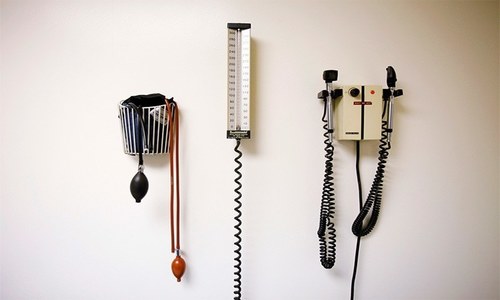Pakistani doctors with MS, MD degrees sacked in Saudi Arabia

LAHORE: In a worrying development, Saudi Arabia and some other Arab countries have rejected the century-old postgraduate degree programme of Pakistan — MS (Master of Surgery) and MD (Doctor of Medicine) — removing it from the eligibility list of the highest paid tier.
This decision has reportedly rendered hundreds of highly qualified medics jobless. A majority of them are in Saudi Arabia who have been told to leave or be ready for deportation.
Rejecting Pakistan’s MS/MD degree, the Saudi ministry of health claimed it lacked structured training programme, a mandatory requirement to hire medics against important positions. After the Saudi move, Qatar, the United Arab Emirates and Bahrain also took the similar step.
Most of the affected doctors were hired by a team of the Saudi health ministry in 2016 when it conducted interviews in Karachi, Lahore and Islamabad after inviting applications online.
One of the affected doctors told Dawn the decision had brought embarrassment for them since the same degree programme offered by India, Egypt, Sudan and Bangladesh was acceptable in Saudi Arabia and other countries.
Degree programme lacks mandatory training, says Saudi health ministry; affected doctors blame CPSP for their plight
This correspondent has obtained copies of service termination letters of several doctors issued by the Saudi Commission for Health Specialties (SCFHS).
“Your application for professional qualification has been rejected. Reason is that your master degree from Pakistan is not acceptable according to the SCFHS regulations,” reads a letter.
Some of the affected doctors and senior health officials in Pakistan blame the College of Physicians and Surgeons Pakistan (CPSP) for damaging their career.
A spokesperson for the Association of University Physicians and Surgeons Pakistan, Dr Asad Noor Mirza, takes it as a setback for Pakistan’s major degree qualification and disrespect to the highly qualified cream of the nation.
He claimed that CPSP delegations during recent visits to Saudi Arabia and some Gulf states had presented distorted facts about Pakistan’s university programme to maintain monopoly of the CPSP-sponsored FCPS qualification.
Mr Noor told Dawn Pakistan had to face a huge loss of foreign remittance in addition to sufferings of the medics in the form of joblessness.
Talking to this correspondent from Saudi Arabia on phone, Dr Ali Usman, an affected medic, said, “I had done five-year postgraduate qualification from the University of Health Sciences, Lahore, with training from Lahore General Hospital... But all of a sudden the Saudi health ministry terminated my job contract, landing me and my family in immense shock.”
Dr Usman said when he contacted Director General of Collaboration Department, Saudi Arabia, Saeedul Barki, he told him that his qualification was rejected when the CPSP delegation told the authorities that there was no training-based post-graduate medical degree in Pakistan, except FCPS. Mr Barki said the CPSP president held multiple meetings with relevant officials in Saudi Arabia and asked the authorities to consider only FCSP qualified Pakistani medics for jobs here.
He said the CPSP had misled the SCFHS ignoring the fact that Pakistan’s university degree qualification was a structured training programme.
University of Health Sciences Vice Chancellor Prof Dr Javed Akram dispelled the impression that the MS/MD programme was not a structured training qualification.
“The MS/MD programme was started in 1914 and the first MS degree was awarded to G.B. Kapoor from Punjab University,” he said.
“The MS/MD degrees have been declared a five-year level-III research and clinical qualification by the Pakistan Medical and Dental Council,” he said.
“The MS and MD degrees are enriched with dynamic, congruent and structured curriculum comprising clinical and research component at par excellence of international standards designed by the World Federation of Medical Education,” Prof Akram said.
He said the University of Health Sciences and many senior medical experts from all over the country had recently took up the issue of termination of jobs of Pakistani medics and also talked to the SCFHS.
According to official figures, currently 4,440 postgraduates are serving at various government and private medical institutions in Pakistan. Of them, 102 are teaching as faculty members in senior positions.
CPSP president Prof Dr Zafarullah Chaudhry could not be contacted for comments despite attempts. However, Dean (academics) of the CPSP, Prof Dr Ghulam Mustafa Arain, rejected the allegations levelled by the affected doctors and said the CPSP representatives had been promoting FCPS qualification during visits abroad to create a good image of Pakistan in the field of medical education.
However, he added, “the CPSP can’t think of degrading any medical education programme of Pakistan abroad”.
Secretary of the Specialised Healthcare and Medical Education Department, Punjab, Momin Agha, said they had taken up the issue with provincial Health Minister Dr Yasmin Rashid. He said after deliberations, it had been unanimously decided to hand over the matter to the medical education committee which was looking after under-graduate and post-graduate degree programmes.
The committee comprising senior medical teachers of high repute would examine the issue in respect of reforms in the MS/MD qualification, if needed, to meet the international requirements.
“It is clear that the MS/MD qualification is a structured degree programme which meets all job requirements locally and internationally,” Mr Agha said.
He said the local health authorities would take up the matter with health managers in the Arab countries.
Published in Dawn, August 7th, 2019












































